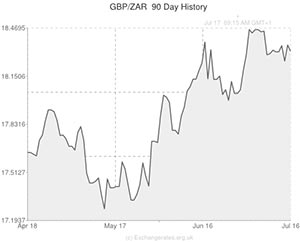
In the latest currency news, the Pound to Rand (GBP/ZAR) exchange rate has fallen by almost 0.4% over the course of Thursday due to a variety of factors.
Firstly, a lack of pertinent UK data kept Sterling trending in a comparatively narrow range against most of its peers.
Secondly, yesterday’s less-than-impressive wage figures kept Bank of England rate hike expectations a little depressed.
Thirdly, industry experts began to voice concerns that the Scottish Referendum, taking place in September, could devalue the Pound.
Other movement in the Pound to Rand exchange rate was triggered by South African developments.
The appeal of the commodity-driven currency initially increased after the National Union of Metalworkers of South Africa asserted that it would ease up on its pay demands.
The strike in the metalworking sector has been dragging on for over two-weeks now and there had been concerns that it might turn into a protracted strike (like the one seen in the platinum sector) so this development is good news for South Africa’s economic outlook.
NUMSA has stated that it will agree to a two-year pay deal.
Yesterday the union turned down a three-year package offered by the Steel and Engineering Industries Federation of Southern Africa, but it now appears they will settle for a 10% increase in 2014 and 2015.
In the view of General Secretary Irvin Jim; ‘We are not far from each other […] we are very flexible. The strike is bleeding the economy. We don’t want to cripple the economy.’
Later in the local session the South African Reserve Bank opted to increase its benchmark interest rate to 5.75% in its second increase of the year so far.
The hike was largely enacted to counter the impact of South Africa’s above-target Consumer Price Inflation.
In a statement published with the decision SARB commented; ‘Since the previous meeting of the Monetary Policy Committee, the economic growth outlook has deteriorated against the backdrop of protracted strike action in the mining and manufacturing sectors. The economy contracted in the first quarter of 2014, and the growth outlook for the rest of the year remains subdued amid low business confidence.’
In reference to the Rand’s exchange rate the central bank noted that it ‘continues to pose an upside risk to the inflation outlook. Having appreciated to a level of R10.29 against the US dollar soon after the previous MPC meeting, the rand exchange rate followed a depreciating trend, reaching a new trading range of between R10.60 and R10.80 since the beginning of June. Since the previous meeting the rand has depreciated by 2.6 per cent on a trade-weighted basis’.
While the Pound continued to trade lower against its South African peer, the Rand weakened against the US Dollar, hitting a low of 10.7235.
Next week it can be predicted that extensive Rand exchange rate movement will occur following the release of South African inflation figures.
UPDATED: 10:25 GMT 18 July, 2014
Pound Sterling Ends Week Softer against Rand
The Pound to Rand (GBP/ZAR) exchange rate plummeted yesterday as it appeared that the over two-week strike in the metalworkers sector might be about to end.
Further Rand gains were occasioned by the news that the Reserve Bank of South Africa increased the benchmark interest rate.
As the week drew to a close the Pound to Rand exchange rate was trading in the region of 18.2640, down 0.5%.
South African Rand (ZAR) Exchange Rates
[table width=”100%” colwidth=”50|50|50|50|50″ colalign=”left|left|left|left|left”]
Currency, ,Currency,Rate ,
Pound Sterling, ,South African Rand,18.2414,
,South African Rand,18.2414,
Euro, ,South African Rand,14.4924,
,South African Rand,14.4924,
US Dollar, ,South African Rand,10.6505,
,South African Rand,10.6505,
Australian Dollar, ,South African Rand,10.0238,
,South African Rand,10.0238,
New Zealand Dollar, ,South African Rand,9.2684,
,South African Rand,9.2684,
Canadian Dollar, ,South African Rand,9.9493,
,South African Rand,9.9493,
[/table]

Comments are closed.